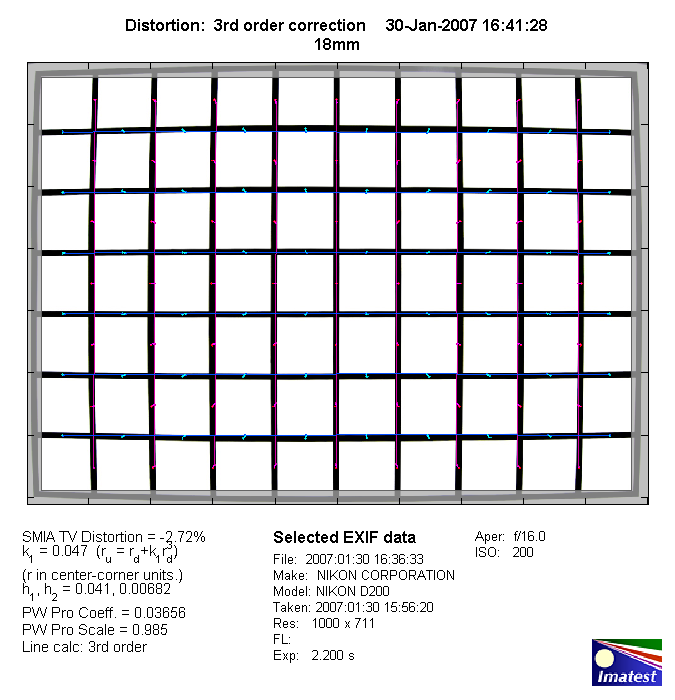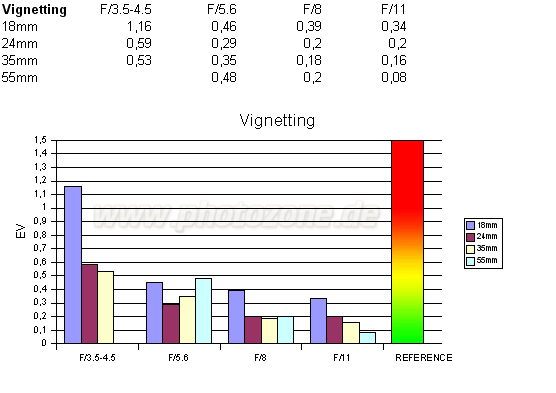|
Nikkor AF-S 18-55mm f/3.5-5.6 G ED DX II - Review / Test Report - Analysis |
|
Lens Reviews -
Nikon / Nikkor (APS-C)
|
|
Page 2 of 2
Distortion
The AF-S 18-55mm II shows the quite typical distortion characteristic for a lens in
this class. At 18mm there is very pronounced barrel distortion which eases
continuously towards the long end of the zoom range. At 55mm the lens is
basically free of distortion.
|
Move the mouse cursor over the focal length text marks below to observe the respective distortions
|
| 18mm |
24mm |
35mm |
55mm |
|

|
The chart above has a real-world size of about 120x80cm.
Vignetting
As mentioned the AF-S 18-55mm DX II is a reduced image circle lens (APS-C) and typical for
such lenses the vignetting is more pronounced compared to classic full frame lenses.
As to be expected the problem is most significant at 18mm @ f/3.5 where the
vignetting exceeds 1.1EV at the image borders. However, this is only a local
issue and a much lesser problem at other focal lengths. At 18mm
it can easily be resolved by stopping down a little. Nonetheless the issue
is pretty well under control for a DX-type lens.

MTF (resolution)
The Nikkor AF-S 18-55mm DX II produced surprisingly high resolution figures under
lab conditions which is quite unusual for a lens in this price class. The
center resolution is excellent throughout the zoom range. The border quality
at the wide-end of the zoom range is soft results at max. aperture - both
regarding resolution and more so contrast. However, stopping down to f/5.6
already improves the borders significantly. At 35mm and 55mm the resolution
characteristic is more even across the frame.
You may find the resolution of this lens to be quite astonishing and maybe hard
to believe. As a reference here´s comparison of 100% portions of the test chart
(center bottom) between this lens and the (very high quality) Nikkor AF 50mm f/1.4D at f/5.6:
Nikkor AF-S 18-55mm f/3.5-5.6G ED DX II @ 18mm f/5.6
Nikkor AF 50mm f/1.4 @ 50mm f/5.6
You may also notice that the center performance is one step up from the test
of the original (mk I) variant. This does surely originate in a better centering
of the mk II sample though centering has a rather different meaning regarding
the degree of wobbling of the inner lens tube.
Please note that the MTF results are not directly comparable across the different systems!
Below is a simplified summary of the formal findings. The chart shows line widths per picture height (LW/PH) which can be taken as a measure for sharpness.
If you want to know more about the MTF50 figures you may check out the corresponding Imatest Explanations
Chromatic Aberrations (CAs)
Chromatic aberrations (color shadows at harsh contrast transitions) can be a problem
at and below 35mm. The average CA pixel width at the image borders easily exceeds
1px with a peak at 18mm f/3.5 (1.7px). This will be visible in some situations
unless you correct the issue via an imaging application.

Sample Shots
Regarding the identical optical design you may check out the sample images of the predecessor.
Verdict
The Nikkor AF-S 18-55mm f/3.5-5.6 G ED DX II is a marginal update to the original
mk I variant. The optical design has not been changed so the general observations
regarding image quality remain the same. The tested mk II sample has a sightly
better centering thus resulting in an improved center quality but regarding the
mechanical qualities of the lens this is a gamble rather than a new feature of the
mk II series. The resolution figures are actually very good and no worse than
those of much higher priced models - truly remarkable. The contrast level at
large apertures (primarily wide-end) leaves something to be desired though. The
distortion characteristic is about average whereas vignetting is surprisingly well
controlled for a DX-type lens (APS-C image circle). Chromatic aberrations are
quite high and can be field relevant in some situations.
Naturally this has all to be seen in the context of the extremely low price tag so
all-in-all it is almost surprising what the lens is capable to deliver. If you use
~f/6.7-f/11 you'll be a happy camper in most situations.
Nonetheless there's no such thing as a free lunch and price level of the
Nikkor AF-S 18-55mm f/3.5-5.6 G ED DX II shows up in the build quality which is
clearly sub-standard. This is probably a sufficient reason alone for some to think
about the AF-S 18-70mm f/3.5-4.5G DX or AF-S 18-135mm f/3.5-5.6G DX as alternative
investments.
|